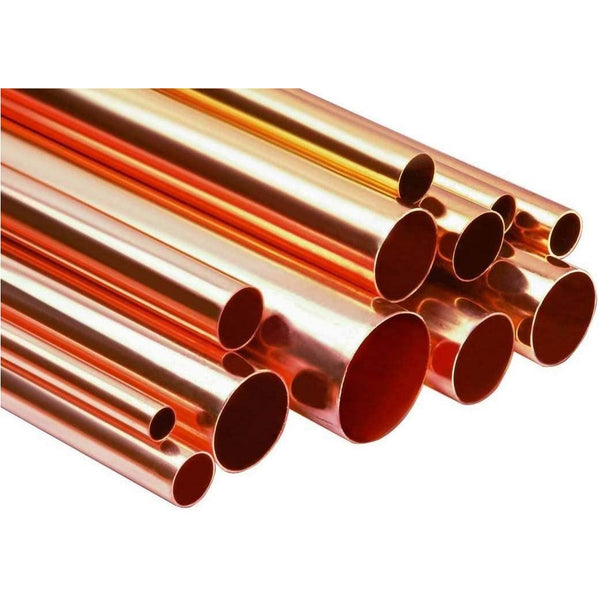Checking Out the Diverse Applications of Copper Products in Modern Industries
Copper products have actually established themselves as crucial parts across a myriad of modern sectors, primarily as a result of their exceptional conductivity, malleability, and resistance to corrosion. From enhancing the performance of electrical systems to playing a vital role in renewable resource modern technologies, the versatility of copper is noticeable. Its recyclability settings it as a lasting choice in production and electronics. As sectors increasingly prioritize advancement and sustainability, the diverse applications of copper necessitate a closer exam, specifically regarding their prospective influence on future technological advancements and environmental techniques.
Electrical Applications of Copper
Copper is a necessary material in the electrical sector, making up about 60% of the complete demand for non-ferrous steels internationally - Copper Products. Its premium electric conductivity, which is nearly two times that of light weight aluminum, makes it the preferred choice for a variety of electric applications. From wiring systems in residential and commercial structures to high-voltage power transmission lines, copper makes certain efficiency and reliability in electrical energy delivery
In enhancement to electrical wiring, copper is essential to the production of electric parts such as transformers, motors, and generators. These elements leverage copper's thermal conductivity and pliability, crucial for warm dissipation and reliable performance. Copper's resistance to rust boosts the life expectancy and resilience of electrical systems, making it a cost-effective solution in the long term.
The development of renewable resource sources, such as solar and wind power, has actually further increased the demand for copper in electric applications. As markets change towards sustainable energy options, copper's duty comes to be also extra critical. Overall, the adaptability and efficiency characteristics of copper strengthen its status as a cornerstone material within the electrical industry, driving technology and effectiveness throughout different applications.
Pipes and Piping Solutions
In modern-day pipes systems, the choice of materials dramatically influences both performance and longevity. Copper has arised as a recommended choice as a result of its one-of-a-kind residential properties, consisting of rust resistance and antimicrobial characteristics. These features ensure that copper piping stays resilient and risk-free for moving safe and clean water, a crucial consideration in property and business applications.
Among the essential benefits of copper in plumbing is its capability to withstand high temperatures and pressures, making it ideal for a range of applications, from hot water systems to heating and cooling down networks. In addition, copper's adaptability permits easier installment in intricate piping layouts, decreasing the danger of failings and leakages.
An additional noteworthy benefit is copper's long life expectancy, commonly exceeding 50 years with correct maintenance. This longevity not only minimizes replacement prices yet additionally adds to lasting techniques by decreasing waste. Copper's recyclability lines up with modern-day environmental standards, promoting a round economic situation within the pipes sector.
Copper in Renewable Energy
The flexibility of copper prolongs past pipes applications, playing a crucial role in the renewable resource industry. Its excellent electric and thermal conductivity makes it an important product in the manufacturing and distribution of eco-friendly power resources, especially solar and wind power. In photovoltaic panels, copper is utilized in photovoltaic cells and wiring, assisting in effective power conversion and transmission. Its resistance to corrosion makes certain durable efficiency, which is essential for taking full advantage of power outcome gradually.

In addition, as the worldwide need for electrical lorries (EVs) rises, copper's function in battery systems and billing framework ends up being also extra significant. The material's capacity to perform electricity efficiently is indispensable to the performance of EV batteries, enhancing range and billing rate.
Copper's Function in Electronic devices
Electronic devices producing depends heavily on copper's remarkable homes, especially its high electric conductivity and thermal efficiency. These characteristics make copper an optimal choice for a large variety of electronic parts, consisting of adapters, motherboard, and electrical wiring. The metal's capability to successfully transfer electrical signals makes certain minimal energy loss, which is important in high-performance digital devices.
Moreover, copper's thermal conductivity plays a substantial role in heat dissipation, protecting sensitive elements from overheating. This is especially vital in modern-day electronic devices, where small layouts result in increased warm generation. Copper is also favored for its pliability and ductility, permitting it to be quickly formed into detailed designs that satisfy the demands of sophisticated digital applications.
With the rise of consumer electronic devices, telecommunications, and electrical lorries, the need for copper in the electronic devices sector continues to grow. Therefore, copper remains a foundation product in the ever-expanding area of electronic devices.
Cutting-edge Utilizes in Manufacturing

One notable application remains in additive production, where copper-based materials are utilized in 3D printing procedures. This permits the creation of intricate geometries and lightweight components, specifically in the aerospace and automobile sectors. Furthermore, copper's thermal conductivity makes it an ideal choice for warmth exchangers, boosting effectiveness in commercial cooling systems.
In addition, the surge of clever manufacturing has actually seen the incorporation of copper in IoT gadgets, where its conductive capacities support innovative sensing technologies. In the world of renewable resource, copper is pivotal in the production of photovoltaic panels visit this website and wind generators, promoting more effective power conversion and circulation.
As industries pursue sustainability and development, copper's flexibility and performance remain to position it as an important product, driving developments in manufacturing and adding to the development of smarter, much more effective items.
Verdict
In summary, copper products show amazing versatility across different modern-day sectors. Copper Products. Their superior conductivity enhances electrical applications, while corrosion resistance ensures reliability in plumbing. The essential function of copper in renewable resource and its essential function in electronic devices emphasize its relevance ahead of time lasting practices. Additionally, ingenious uses in manufacturing highlight copper's adaptability and enduring importance. Jointly, these applications show copper's essential payment pop over to this web-site to technical development and industrial efficiency in modern society.
From enhancing the performance of electric systems to playing a crucial duty in sustainable energy modern technologies, the convenience of copper is obvious. As industries progressively focus on technology and sustainability, the diverse applications of copper warrant a closer exam, especially regarding their possible influence on future technical developments and ecological methods.
The growth of sustainable energy resources, such as solar and wind power, has additionally enhanced the need for copper in electrical applications. In general, the versatility and performance characteristics of copper solidify its standing as a foundation product within the electrical industry, driving advancement and performance throughout numerous applications.
The convenience of copper prolongs beyond pipes applications, playing an important role in the sustainable power market.